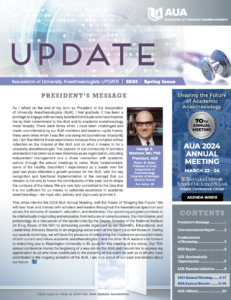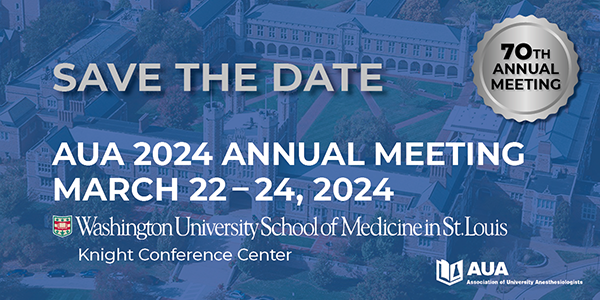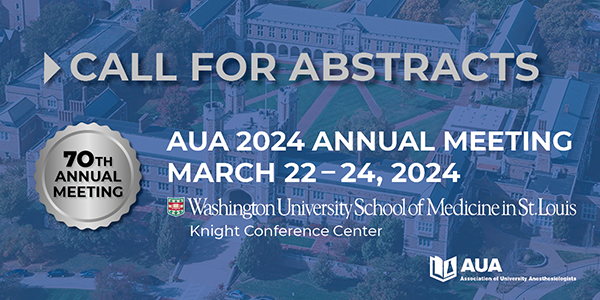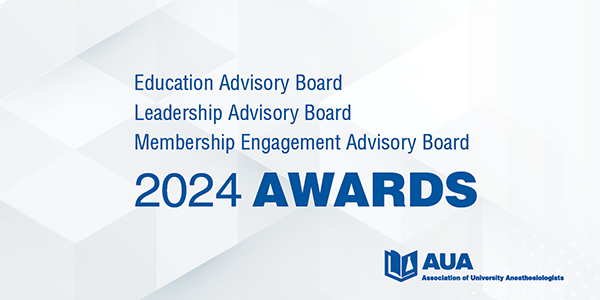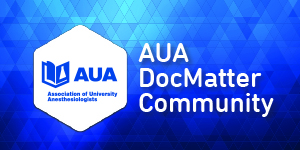President’s Lunch and Panel
President's Lunch
The President’s Lunch featured Bruce Biccard, MD, University of Kwazulu-Natal, South Africa, on “The Innovation of ASOS”; Julie K. Freed, MD, PhD, Medical College of Wisconsin, on “Fundamental Scientist in Anesthesiology”; Jessica Spence, MD, McMaster University, on “Clinical Outcomes Scientist in Anesthesiology”; and Phillip Vlisides, MD, University of Michigan Medicine, on “Translational Scientist in Anesthesiology.”
“Fundamental Scientist in Anesthesiology”
Changing demographics will lead to a drastic increase in heart disease within the United States. This lab focuses on microvascular dysfunction which precedes the formation of coronary artery disease. Using strategies to study human microvascular function in vitro, it investigates how sphingolipids—a group of biologically active lipids—can promote or prevent vascular dysfunction. In addition to examining human vascular reactivity in vitro, this novel technique is now being used to improve vascular function and functional capacity in frail, elderly cancer patients prior to surgery.
“Clinical Outcomes Scientist in Anesthesiology”
Historically, research in anesthesiology has focused on physiologic phenomena occurring in the immediate perioperative period. Recently, there has been a recognition that researchers in perioperative medicine need to study outcomes of greater importance to patients, as well as the long-term consequences of surgery and anesthesia. This has resulted in studies with larger sample sizes that focus on outcomes like major morbidity and mortality within 30-days of and up to one year after surgery. However, as patients of older age and with greater co-morbidity are advanced for surgery, it is becoming increasingly important to understand not only the consequences of surgery and anesthesia on major morbidity and mortality but also functional outcomes like cognition, mobility, and daily self-care. Currently, there is limited knowledge as to the prevalence and predictors of, risk factors for, and interventions that can prevent perioperative cognitive and functional decline. The program of research is focused on addressing this knowledge gap through several large multi-center cohort studies as well as a large, multi-center, randomized cluster crossover trial.
“Translational Scientist in Anesthesiology”
Perioperative caffeine may serve as a candidate, neurobiologically informed intervention for improving postoperative neurologic recovery. Basic science data from the University of Michigan demonstrate that caffeine may provide acute analgesic benefit while also minimizing postoperative hypersensitivity for up to one week after surgery in a rat model. These findings align with clinical data to suggest that caffeine may serve as an effective adjuvant analgesic across different surgical populations. Interestingly, recent translational evidence from the University of Chicago also suggests that caffeine may accelerate emergence and neurocognitive recovery following general anesthesia. Overall, these clinical-translational lines of investigation suggest that caffeine may improve postoperative recovery by mitigating postoperative pain and neurocognitive dysfunction. A large-scale clinical trial is warranted to test the effectiveness of these preliminary findings.
President’s Panel
The AUA President’s Panel—“The Reproducibility Crisis in the Era of Precision Medicine”—was held during the afternoon and was moderated by Michael Avidan, MBBCh, Washington University School of Medicine, AUA Council President. Presenters included David Mazer, MD, University of Toronto, on “Conflict Between Evidence and Practice: Why It Exists”; Regina Nuzzo, PhD, Gallaudet University, on “How We Scientists Can Stop Fooling Ourselves”; and Philip Payne, PhD, Washington University School of Medicine, on “Precision Medicine: The RCT is so Passé.”
